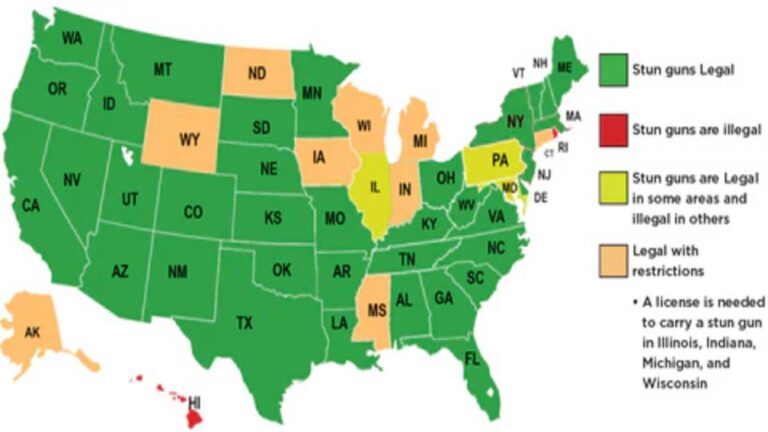Table of Contents
- Legal Considerations When Carrying a Stun Gun in Public
- State and Local Regulations to Be Aware Of
- Safety Tips for Responsible Stun Gun Use
- What to Do If You Are Detained or Questioned About Your Stun Gun
- Final Thoughts
Legal Considerations When Carrying a Stun Gun in Public
Before carrying a stun gun in public, it’s essential to understand the complex legal landscape surrounding its possession and use. Laws vary widely by state, county, and even city, with some jurisdictions permitting stun guns with minimal restrictions while others impose stringent regulations or outright bans. Key legal factors to consider include:
- Age requirements for lawful possession
- Required permits or licenses
- Restrictions on carrying stun guns in schools, government buildings, or airports
- Limitations on stun gun power or design
Failing to comply with local laws can lead to serious consequences such as fines, confiscation, or even criminal charges. It’s advisable to consult official state statutes or seek legal counsel if you’re uncertain about your area’s regulations. Keeping updated on changes to laws is also critical, as legislation surrounding personal defense weapons continually evolves.
State and Local Regulations to Be Aware Of
When considering carrying a stun gun, it’s crucial to recognize that laws can vary significantly from one state to another, as well as between local jurisdictions. Some states allow the open carry of stun guns without permits, while others impose strict licensing requirements or outright bans. Additionally, certain cities and counties may have their own ordinances that further restrict possession or usage. Ignoring these variations can lead to serious legal consequences, including fines or criminal charges.
To stay compliant, focus on these key points:
- Check the state regulations: Some states require background checks or age limits for stun gun ownership.
- Research local ordinances: Cities and counties may have unique rules, especially in sensitive areas like schools, government buildings, or public transportation systems.
- Understand usage restrictions: Even in states where carrying is legal, using a stun gun outside of self-defense can result in criminal charges.
Always verify your specific location’s current laws before carrying a stun gun in public. Consult official state and local government websites or legal professionals to ensure you’re fully informed and compliant.
Safety Tips for Responsible Stun Gun Use
When carrying a stun gun, it’s crucial to prioritize safety not only for yourself but also for those around you. Always ensure your device is fully charged and functioning properly before carrying it. Familiarize yourself with its operation-practice activating and deactivating it in a safe, controlled environment so you’re prepared if ever you need to use it in an emergency. Remember to keep your stun gun securely holstered or stored when not in use to prevent accidental discharge. Never point or test the device on another person, as misuse can lead to serious injury or legal consequences.
Adopting responsible habits can significantly reduce risks associated with stun gun ownership. Some key practices include:
- Keep the stun gun out of reach of children and unauthorized individuals.
- Understand your local laws regarding where and how the stun gun can be carried or deployed.
- Use the stun gun strictly as a defensive tool-avoid brandishing it or using it to escalate confrontations.
- Inspect the device regularly for damage or wear, and replace batteries as needed to maintain reliability.
What to Do If You Are Detained or Questioned About Your Stun Gun
Remain calm and composed if law enforcement officers approach you regarding your stun gun. Politely inform them that you are aware of the local laws governing stun gun possession and are willing to cooperate fully. It is essential to know your rights-you have the right to remain silent and to ask if you are free to leave. Avoid making sudden movements or reaching into bags without permission, as this could escalate the situation.
When questioned, provide clear and concise answers. You may want to carry documentation such as proof of purchase, permits, or any relevant state licenses to demonstrate compliance. Remember, showing respect and transparency can often diffuse tension. If detained, request to speak with a legal representative before answering any further questions. Key points to keep in mind:
- Stay calm and respectful.
- Know and assert your legal rights.
- Carry supporting documentation when possible.
- Request legal counsel if detained or charged.
Final Thoughts
In conclusion, understanding the laws surrounding carrying a stun gun in public is crucial to staying both safe and compliant. While stun guns can be an effective self-defense tool, regulations vary widely depending on your location, and ignorance of these rules can lead to serious legal consequences. Before deciding to carry a stun gun, make sure to research your local, state, and federal laws, and consider consulting with a legal professional if you have any doubts. Staying informed ensures that you protect not only yourself but also your rights. Stay safe and stay smart!Check Our Other Blogs
- StunGun – Your Trusted Source for Stun Guns, Laws, and Self-Defense Tips
- PepperSprayLaws – Your Trusted Resource for Pepper Spray Information
- StunGunLaws – Your Trusted Guide to Stun Gun Legality and Safety



